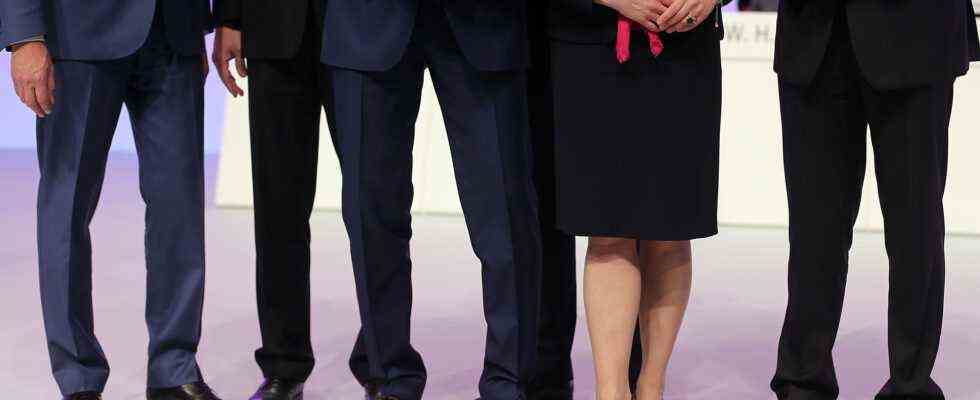background
As of: 08/20/2021 8:15 a.m.
In September the time has come: Germany’s leading stock exchange index will be expanded from 30 to 40 companies. New rules also apply so that there is no new Wirecard disaster.
The most important German stock index DAX is facing the biggest change in its 33-year history. In September, ten more will be added to the 30 companies in the first German stock exchange league. This is intended to represent the German economy in a more representative way than before. That means fewer representatives of the “old economy” and more from the Internet economy. At the same time, Deutsche Börse has revised and reformed the entire set of rules for inclusion and retention in the index.
The most important innovation is that when selecting candidates, only the market capitalization of the freely traded shares of the past 20 trading days is decisive. This means that those who reach positions 1 to 40 among the 231 companies currently qualified for inclusion are included in the DAX. The previous ranking in terms of stock exchange turnover in the Xetra electronic trading system, however, no longer plays a role. In the future, a minimum turnover will be sufficient.
All index members have been obliged to publish both audited annual reports and quarterly reports since March. Companies that do not comply with this rule after a 30-day period will be excluded from the DAX. With this, Deutsche Börse wants to avoid a second Wirecard disaster. The payment service provider postponed the publication of its figures several times in spring 2020, but still remained in the DAX. Even after filing for bankruptcy, it was weeks before the company was banned from the benchmark index.
Experts consider reform overdue
Another new feature is the review of the index composition, which takes place twice a year, in March and September. So far, the Working Group for Equity Indices has only done this once a year, in September. In doing so, Deutsche Börse has ignored experts’ calls for greater continuity in the composition of the DAX. Fund managers in particular had complained that the constant change in members made it difficult to compare them with other indices abroad and that DAX investors also cost money because every reallocation involved effort.
Most experts, however, welcome the reforms. Nermin Aliti, fund manager at the Düsseldorf asset manager Laureus, says: “The higher diversification and the increasing share of dynamically growing companies are positive for the DAX. The broader a stock market barometer, the lower the weighting of individual market capers.”
In addition, the German economy is represented better and more representative with a DAX 40 than is the case with 30 members. In addition to companies from traditional industry, the extended index shows a wider range of the German economy and thus also companies with future-oriented business models. In doing so, I bring the stock exchange closer to the customs of other countries. France and Italy, for example, use their leading index to represent their economies. That is why their leading indices each have 40 values, Spain at least 35. A hundred companies are represented in the British FTSE 100.
Airbus biggest newcomer
The Darmstadt economics professor Dirk Schiereck had in the past even spoken out in favor of increasing the DAX to 50 stocks in order to better reflect the diversity and breadth of the German economy. This is necessary to enable more medium-sized companies, which form the actual backbone of the domestic economy, to have easier access to the financial markets.
The exact list of potential candidates for promotion will not be announced until after 10 p.m. on September 3. But it is already clear that all of these are companies that are currently listed in the MDAX small cap index. This, in turn, will be reduced by ten to 50 values as part of the reform in September.
According to the calculations, Airbus will be the largest newcomer to the DAX 40. In terms of market capitalization, the aircraft manufacturer is the fifth largest German company. The inclusion in the German benchmark index has so far failed because the shares of the group, in which the governments in Germany, France and Spain are involved, is mainly traded in Paris, where it is an integral part of the local benchmark index Cac40.
More medium-sized companies
The DAX entry of the Berlin online fashion retailer Zalando and the medical technology group Siemens Healthineers, a spin-off of the Siemens group, also seems almost certain. Medium-sized companies that are little known to the general public also belong to the likely climbers.
These include the fragrance and flavor manufacturer Symrise, based in Holzminden in Lower Saxony, one of the world’s leading companies in the industry and currently valued at EUR 16.7 billion on the stock exchange. These highly specialized DAX climbers previously listed in the MDAX also include the Göttingen laboratory equipment supplier Sartorius and the chemicals trader Brenntag. In addition, the cook box mail order company Hellofresh and Porsche SE – the holding company that holds the majority of the ordinary shares in the Volkswagen Group – have a good chance of getting into the leading index. The same applies to the Nivea manufacturer Beiersdorf with a market valuation of 23.6 billion euros and the sporting goods manufacturer Puma (15.7 billion euros).
However, experts warn that even a DAX with 40 members is not immune to turbulence and losses. In addition, it is risky to only rely on a single index. Critics also complain that the DAX’s “car load” would increase even further if Porsche SE were accepted. Then five companies in the sector are represented in the index. Changes are already becoming apparent: If the Vonovia housing company succeeds in swallowing its competitor Deutsche Wohnen in the third attempt, a successor for the Berlin company would have to be found.

